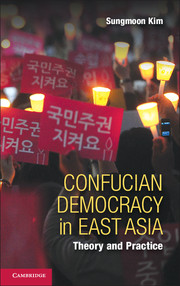Book contents
- Frontmatter
- Dedication
- Contents
- Acknowledgments
- Introduction
- Part I Beyond Thick Confucian Communitarianism and Meritocratic Elitism
- Part II Confucian Democracy in Theory – A Pluralist Reconstruction
- Part III Confucian Democracy in Practice – The Korean Case
- 8 Motivating and Legitimating Confucian Democracy: The Politics of Chŏng
- 9 Confucian Public Reason and the Liberalism of Human Rights
- 10 Confucian Civility and Expressive Liberty
- 11 Confucianizing Multiculturalism
- Bibliography
- Index
- References
9 - Confucian Public Reason and the Liberalism of Human Rights
Published online by Cambridge University Press: 05 June 2014
- Frontmatter
- Dedication
- Contents
- Acknowledgments
- Introduction
- Part I Beyond Thick Confucian Communitarianism and Meritocratic Elitism
- Part II Confucian Democracy in Theory – A Pluralist Reconstruction
- Part III Confucian Democracy in Practice – The Korean Case
- 8 Motivating and Legitimating Confucian Democracy: The Politics of Chŏng
- 9 Confucian Public Reason and the Liberalism of Human Rights
- 10 Confucian Civility and Expressive Liberty
- 11 Confucianizing Multiculturalism
- Bibliography
- Index
- References
Summary
As far as its constitution is concerned, Korea is a liberal-democratic country. However, while its “democratic” character has been firmly affirmed in recent years, its “liberal” character still remains ambiguous. Though there is notable dissatisfaction with the formal/procedural definition of democracy in terms of a free and regular election based on the principle of one person, one vote among Koreans (especially among the left who understand democracy in a more substantive sense), they believe democracy, for which they have shed blood, is irrevocable in Korea. At a minimum, there is wide consensus across the ideological spectrum that the June Uprising of 1987 is the landmark event that vividly separates the post-1987 regime from the previous ones, qualifying it to be democratic. But what is the parallel event for Korean liberalism? Was the June Uprising a “liberal-democratic” revolution? Or does democracy naturally refer to liberal democracy? If we grant that Korean democracy is a liberal democracy, what kind of liberalism does it imply?
For a long time, Koreans have equated democracy with liberal democracy, understanding liberalism in the Cold War context, namely, as the antithesis of the communism of the North. For them, democracy is what they had (and still have) to fight for because it is about power and the common and equal sharing of power (i.e., collective self-government or popular sovereignty) had long been suppressed by earlier authoritarian regimes. However, in the popular understanding, Korea has always been (even under the authoritarian reigns) a liberal country, meaning opposed to, and often threatened by, communism. In fact, for some, because of the threat of communism, or to safeguard liberalism, human rights, the core value of liberalism, had to be suppressed at times. In short, in Korea, liberalism was not so much what the people had to fight for internally as what they had to guard against in the face of the external threat of communist forces. This strong ideological understanding of liberalism still deeply permeates Korean society.
- Type
- Chapter
- Information
- Confucian Democracy in East AsiaTheory and Practice, pp. 227 - 245Publisher: Cambridge University PressPrint publication year: 2014



